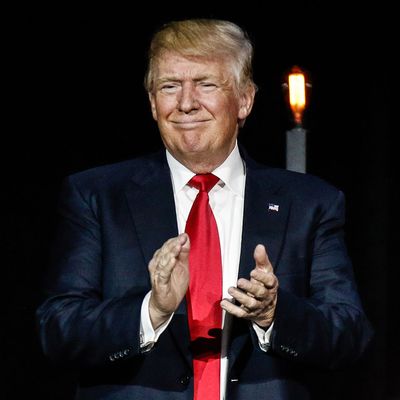
Before his message was overshadowed by a scandal about his use of a white-supremacist image — a mistake that could happen to any candidate, really, so long as that candidate had inspired a massive following among neo-Nazis — Donald Trump was trying to make a point about Hillary Clinton’s corruption. She is the “most corrupt candidate ever,” he claims. Corruption is indeed a plausible line of attack against Clinton — or, at least, it would be, if the opposing candidate was anybody other than Donald Trump, who may actually be the most corrupt presidential candidate ever.
It should be conceded that the evidence against Clinton is fairly damning. After Bill Clinton left the presidency, the former First Couple intermingled career and personal interests in ways that, at minimum, exposed them to a high risk of contamination. The Clinton Foundation was not only a charitable endeavor but a vehicle for Bill Clinton to enjoy the comforts and exercise the quasi-official power of an active figure on the world stage. Donors to the foundation included many of the same businesses and individuals who paid the Clintons for private speeches, and who had an interest in cultivating close ties with a secretary of State and potential future president. Some of those figures had business interests that aligned with Russian strategic goals rather than American ones. The Clintons failed to promptly disclose all of their foundation donors and, on at least one occasion, appointed an apparently unqualified donor to a State Department board.
The evidence of Clinton corruption is circumstantial rather than direct. If they wanted to stay above reproach, they could have rigorously disclosed every dollar that passed through their personal and professional accounts, and made it plain that neither donating to their foundation nor hiring them for speeches would purchase any special treatment whatsoever — indeed, they bent over backward to demonstrate that they could not be bought. Instead, they profited from the ambiguity.
The case against Hillary Clinton is that her administration might be corrupted around the margins — in its minor appointments or pardons and in the relative ease in which some donors get their calls returned — but that the basic contours of her administration would be a continuation of the non-corrupt center-left program of the Obama administration. The case against Trump is qualitatively different. Trump is flamboyantly corrupt in ways that run to the very core of his identity and prospective governing choices.
This is all the more remarkable given that Trump’s complete lack of experience in public office ought to provide him with the opportunity, which most novice candidates have, for a clean-slate résumé. Instead, he is already waist-deep in stench. Trump has not merely intermingled campaigning with his business interests; the two are one and the same. His entire political career seems to be an outgrowth of his efforts to build his personal brand, which Trump has endlessly used the campaign as a platform to promote. He has devoted speeches to attacking the judge in the fraud suit against his “university,” instructed surrogates to do the same, and promised to relaunch the enterprise if elected. He celebrated the Brexit vote, which drove down the value of the pound, as helpful for driving visitors to his Scottish golf course. This sort of behavior is not an appearance of a conflict of interest but the definition of one.
Trump appears to be genuinely unaware, even at the conceptual level, that his business interests might complicate his ability to govern in the public interest. During the primary, when a debate moderator asked if he would put his holdings in a blind trust, Trump comically replied that he would, while defining a “blind trust” to mean his children would run his business for him, which is the opposite of a blind trust. Even if Trump wanted to distance himself from his business interests, the nature of his holdings would make it virtually impossible, as The Wall Street Journal explains today. A traditionally rich person could place their wealth in third-party hands without knowing what they were invested in; Trump’s business is his personal brand, making divestment impossible. “Trump’s empire would pose unprecedented conflicts of interest due to the size of its holdings, privately held nature of the family-run business, and concentration in one industry,” Richard Painter, the Bush administration’s ethics lawyer, tells the Journal.
Trump’s entire business career reeks, beginning with his early associations with organized crime and proceeding through a career of swindling. “No other candidate for the White House this year has anything close to Trump’s record of repeated social and business dealings with mobsters, swindlers, and other crooks,” reports David Cay Johnston. Trump is not merely comfortable doing business with criminals and thugs — his habits of manipulating bankruptcy laws and swindling his partners have left him reliant upon, let us say, unconventional sources of investment, many of whom are the scum of the Earth. Franklin Foer lays out impressive circumstantial evidence that Trump may well be a puppet of Vladimir Putin, with whom Trump shares a web of financial ties that help explain their shared worldview. Whatever we might think of Clinton, we can be confident she is not controlled by the Kremlin. And the failures of disclosure or record-keeping in her operations pale beside Trump’s defiant refusal to disclose his tax returns.
It is altogether fair to condemn Clinton as a corrupt practitioner of the Washington cash-for-access culture. She and her husband are careless, susceptible to greed — normal politicians, in other words. Trump is the figure whose corruption stands out on a historic scale, and the notion that disdain for corruption would supply a rationale to elect him is nothing short of bizarre.






























